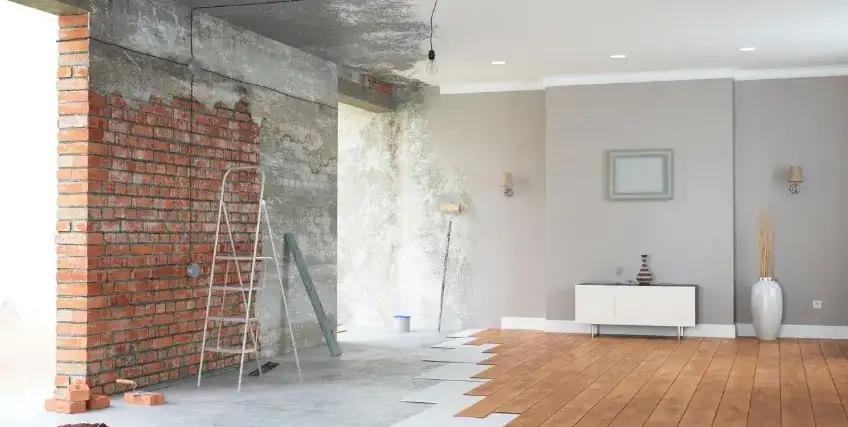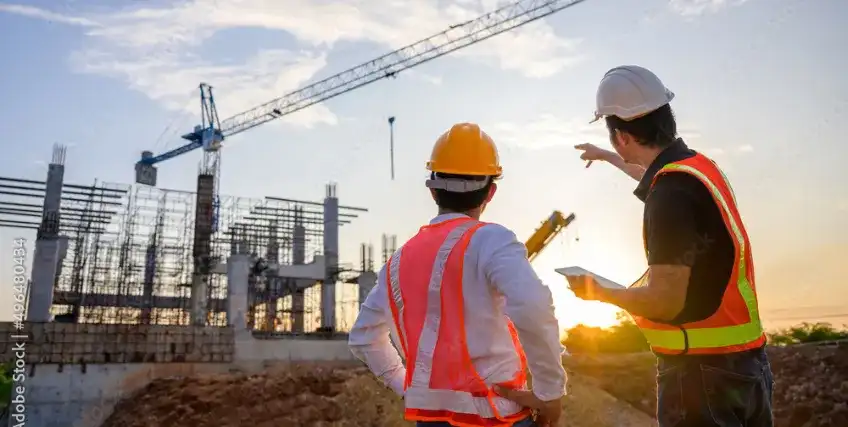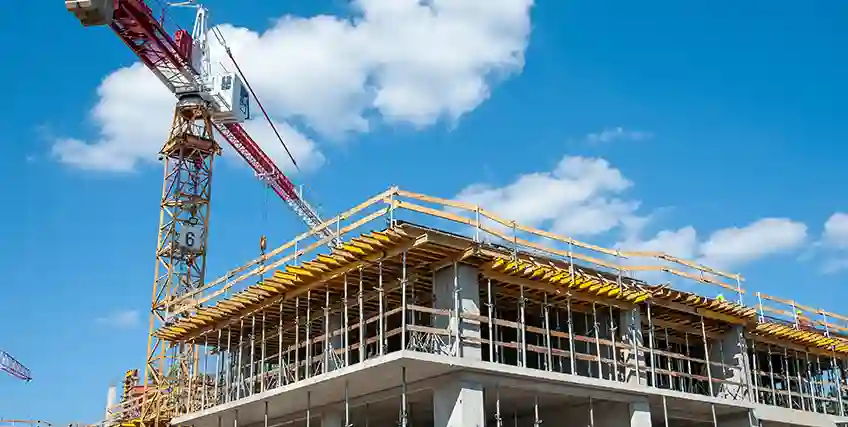How to Choose the Best Construction Loan Lender for Renovation Projects
September 11, 2025 | Last Updated on: September 11, 2025

Every construction project, whether it's commercial renovation or a new home build, involves significant planning and investment. The most important thing about choosing the best construction loan lender isn't just about securing funds, it's about ensuring smooth execution, protecting cash flow, and avoiding costly delays.
Business owners and homeowners can choose from a variety of loan options including construction-to permanent loans, renovation loans, and more, each of which come with different interest rates, repayment structure, and disbursement schedules. However, understanding the nuances of construction financing and choosing the best construction loan lender can save time, money, and stress.
In this article, we'll break down the essential elements of selecting the best construction loan lenders, explaining loan types, loan application processes, repayment options, and key considerations. So, by the end, you will have a clear roadmap to choose the right financing option and the best companies for construction loans that aligns with your project goals and business strategy.
What is a Construction Loan
A construction loan is a short-term financing option created to fund home construction, commercial business renovations, or remodeling projects. Unlike a traditional mortgage which provides a lump sum upfront, construction loans release money in stages through what's called draw-based disbursements. These disbursements are often tied to specific milestones during the construction phase, such as laying the foundation, completing framing, or finishing interiors.
During this period, borrowers are usually required to make interest-only payments on the funds already disbursed. Hence, this setup helps manage cash flow since you aren't paying interest on the full loan amount before it's used.
Moreover, once the construction work is completed, the loan amount can either be paid off with a new permanent mortgage, or in some cases, it automatically converts into one, providing long-term stability with either a fixed-rate or adjustable-rate structure.
Why Borrowers May Need Construction Loans
Business owners generally look for some of the best construction loan lenders seeking construction loans to:
- Manage cash flow during the construction phase.
- Cover unexpected expenses for remodeling or home improvement costs.
- Build home equity or increase commercial real estate value.
- Access different financing options with low down payment or flexible payment options.
Different Types of Construction Loans
Understand when considering construction loan options from some of the best construction loan lenders, they offer multiple financing options. Business owners can often choose from:
Construction-to-Permanent Loans
A construction-to-permanent loan often funds your construction project during the building phase. Once the project is completed, the loan automatically converts into a permanent mortgage. This loan structure eliminates the need for multiple closings, which helps reduce overall costs and paperwork. Moreover, these loans are offered by some of the best construction loan lenders as either fixed-rate mortgages or adjustable-rate mortgages, giving borrowers flexibility in how they manage their long-term payments.
Construction-Only Loans
A construction-only loan covers just the construction phase of a new home or major business remodeling project. Once the construction ends, the borrower must secure separate permanent financing, such as traditional mortgage or refinance into a different loan program. While this loan option provides flexibility, it does involve paying two sets of closing costs, which can increase the total expense for business owners and homeowners.
Renovation Loans
A renovation loan is designed for homeowners and business owners who want to improve or upgrade an existing home or business property rather than building from the ground up. Different loan programs like FHA 203(k) or USDA renovation loans allow for financing with relatively low down payment. As a result, this makes it easy for first-time homebuyers or business owners to access renovation loans from some of the best construction loan lenders. Also, these loans can be used for projects ranging from kitchen remodels to larger-scale structural improvements, offering practical solutions for both small and large home improvement needs.
Owner-Builder Loans
An owner-builder loan is intended for borrowers who plan to act as their own general contractor during the home construction process. While this type of financing can significantly cut costs by removing contractor fees, it comes with added responsibility. Lenders usually require detailed planning and evidence of construction knowledge before approving this type of loan, as the risk is higher compared to traditional construction financing.
One-Time Close Construction Loans
A one-time construction loan combines both construction financing and the permanent mortgage into a single package. As a result, this simplifies the loan application process by requiring only one approval and one closing. Since everything is handled upfront, business owners can save on upfront closing costs and avoid the stress of applying for a second loan once its construction is finished.
Key Considerations When Choosing a Lender
Choosing the best construction loan lender is as important as choosing the right loan program. Here's what to focus on:
Reputation and Experience
- Look for lenders recognized as the best construction loan companies or best new construction loan lenders.
- Verify registration with NMLS and FDIC insurance.
- Ask about past construction financing projects and client satisfaction.
Interest Rates and Loan Terms
- Compare interest rates for fixed-rate versus adjustable-rate loans.
- Check if lenders offer interest-only payments during construction to reduce monthly costs.
- Confirm loan amounts align with your construction project needs.
- Understand origination fees, down payment requirements, and repayment schedules.
Application Process and Disbursements
- A streamlined application process saves time and avoids delays.
- Confirm the lender's underwriting timeline and how disbursements are handled.
- Make sure funds are released promptly to prevent project interruptions.
Loan Officer Support
- A knowledgeable loan officer can guide you through types of construction loans, permanent financing, and refinancing options.
- Accessibility in-person or online is crucial for handling issues quickly.
Comparing Some of the Best Construction Loan Lenders
Finding the best construction loan lenders often requires looking beyond the advertised interest rates. Since every construction project has different needs, borrowers should look for lenders who offer flexibility, clear guidance, and reliable support throughout the construction phase.
Therefore, when comparing the best construction loan lenders, focus on these factors:
Loan Structures
- Consider loan options such as interest-only payments, adjustable-rate, or fixed-rate mortgage plans.
- Look for availability of construction loan options that match your construction period and repayment timeline.
Costs and Fees
- Before considering the best construction loan lenders, always review origination fees, closing costs, and any upfront charges.
- Also, ask about penalties for early repayment or refinancing.
Down Payment Requirements
- Some construction loan lenders might demand a high down payment, while others offer low down payment loan programs.
- Certain FHA 203(k) and USDA-backed loans reduce upfront costs for first-time homebuyers and homeowners.
Lender Reputation
- While looking for the best construction loan lenders, look for FDIC-insured banks, credit unions, and the best companies for construction loans listed in the NMLS registry.
- Consider customer service, how responsive is the loan officer during the application process and underwriting.
Flexibility and Extras
- Some lenders provide a line of credit for home improvement projects beyond the main build.
- Others may allow using home equity or a lot loan as part of your financing package.
Hence, comparing lenders with these points in mind helps borrowers choose the best new construction loan lenders for their goals. The right lender can turn a construction loan into a smooth path toward your dream home or remodeled property.
Hidden Costs Every Borrower Should Watch
Even the best construction loan lenders have costs that borrowers might overlook. These include:
- Closing Costs: Fees for processing the loan, which can vary widely.
- Origination Fees: Charged upfront for securing the loan.
- Disbursement Fees: Some lenders charge for each staged fund release.
- Refinancing Costs: If you plan to refinance to a permanent mortgage later, know the fees.
The Bottom Line
Now we can say that a successful renovation or new construction project starts with the right financing options. However, understanding construction loan options, comparing the best construction loan lenders, comparing interest rates, and reviewing loan terms helps borrowers make informed decisions.
Business owners and homeowners can choose from a wide range of loan options, from renovation loans to one-time close construction loans when seeking financing options. Additionally, proper planning with a reliable loan officer ensures smooth disbursements, manageable repayments, and the completion of your dream home or commercial project.
Hence, don't leave your construction project to chance. Explore the best construction loan lenders, evaluate loan programs, and secure financing to bring your vision to life efficiently.
FAQs About the Best Construction Loan Lenders
What types of construction loans are available for renovation projects?
There are several types of construction loans available for renovation projects such as construction-to-permanent loans, construction-only loans, renovation loans, owner-builder loans, and one-time close construction loans. However, each type of loan varies in loan amount, repayment structure, and interest rates.
How do I compare the best construction loan lenders?
To compare the best construction loan lenders, start by looking at loan terms, interest rates, and repayment options. Moreover, consider lender reputation, FDIC insurance or credit union affiliation, and support from a loan officer. Also, make sure to review closing costs, origination fees, and available loan programs like FHA, USDA, or low down payment options.
What is a construction-to-permanent loan?
A construction-to permanent loan is a funding option that finances the construction project and automatically converts to a permanent mortgage once the build is complete. This loan option eliminates a second closing, reduces upfront costs, and allows for either fixed-rate or adjustable-rate mortgage loan options. Hence, it's ideal for borrowers seeking convenience and long-term stability.
Can I use a renovation loan to finance my home improvement project?
Renovations loans are specifically designed for upgrading an existing home or a real estate building. Loan programs like FHA 203(k) or USDA renovation loans allow borrowers to include remodeling costs in the total loan amount. Therefore, renovation loans from some of the best construction loan lenders are suitable for small upgrades or larger construction projects, often with low down payment options.
How important is my credit score for a construction loan?
Your credit score plays an important role for loan eligibility, interest rates, and loan amount. Borrowers with a good credit score typically qualify for better rates and more favorable repayment terms. Additionally, maintaining a strong credit is essential, especially for first-time homebuyers or those applying for larger construction financing projects.
Frequent searches leading to this page
Related Articles
Beyond Banks: The Rise of Fintech Contract Financing Lenders and Real-Time Funding
January 5, 2026
New Construction Loans for Investors: The Ultimate Financing Guide
December 19, 2025
A Contractor’s Guide to Financing Commercial Construction with Business Loans
November 20, 2025
Term Loans are made by Itria Ventures LLC or Cross River Bank, Member FDIC. This is not a deposit product. California residents: Itria Ventures LLC is licensed by the Department of Financial Protection and Innovation. Loans are made or arranged pursuant to California Financing Law License # 60DBO-35839




